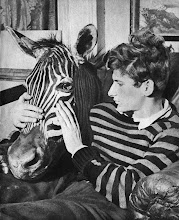I. ONTOLOGY
"Young dictionary make words make sense." - Lil' Wayne
We are accustomed to what I will call a grammar of reason. As the grammar of language directs the combination of words into intelligible sentences, the grammar of reason directs the combination of ideas into more complex forms (we may recall the lessons of our instructors on the composition of an essay-- introduction, thesis, evidence, evidence, summary, conclusion). The ordinary practice of language reifies this grammar of reason, which in turn represents a Master Order, an authority which dictates where it is permissible or polite to draw relation between ideas. Those who cannot adapt to this Order are considered mad.
Hip-hop proposes a language system entirely other, a liberated ontology unconstrained by the traditional grammar of reason in which ideas may be associated by relations forbidden to the logic lexicon of the Master Order.
At an elementary level, this ontology functions on a referential logic, drawing connections along the lines of:
Analogy
("Lyrics is weak like clock radio speakers" -- Genius/GZA)
Metaphor
("Girl you be the bomb/And Bobby be shellshocked" -- RZA)
Allusion
("Walk a road of a great length too long to measure/My Clan make me rhyme like D-Banner under pressure" -- GZA/Genius)
Hip-hop is preoccupied with the intricacies and malleability of language, unfolding then reconstituting and recontextualizing words and phrases to form new meanings. This is expressed in form such as:
Double Entendre
("Recognize the black cat with the nine lives/Get up off me nigga it's bad luck to cross me..." -- Jay-Z)
Homophony
("Young dictionary make words make sense/Then I make cents make dollars..." -- Lil' Wayne")
Paraphrase
("Your firearms too short to box with god..." - Talib Kweli)
Word Deconstruction
("I'm so like a Pip/I'm glad it's night..." -- Andre 3000)
Anagram
("We only increase if everything is peace/Father you see King the police" -- GZA/Genius)
This preoccupation is also expressed on a purely sonic level:
Rhythm
("Drink a Heineken as we go inside the mind again/Never minding men dropping gem/Can he shine again/Most definite/Let this be my last will and testament/For the pessimist/Exercise for the exorcist" -- Method Man)
Texture
("Loaded four-fours on low/Where the cheese at/Fresh of the jet to the 'jects/Where the G's at?" -- T.I.)
Onomatopoeia
("So you act dumb like uuuhh duh/And the drummer boy go pa rum pum pum pum" -- Missy Elliott)
The style and practice of this language system may be characterized as "flow."
This alternate language/reason is not without precedent. Hip-hop's place in the continuum of black oral traditions is widely discussed (more on this in Thesis II); one also finds a resemblance to various styles of Modernist prose, be it the Cubist language of Gertrude Stein or the bugfuck stream-of-consciousness favored by William Burroughs.
However, in the instantaneous line-by-line thought-to-thought context of hip-hop (seen distilled in the mode of the freestyle), this language attains a form uniquely its own. In skilled execution, the effect is surreal and utterly mystical. As the rhyme unfolds, unsuspected parallels emerge, unexpected relationships are revealed; here, a hidden order of things is illuminated, a glimpse of a pattern beyond the veil of reason.
I originally envisioned an illustration to accompany this piece, an adaptation of Paul Klee's "Angelus Novus" decked out in ballybucks and a diamond grill wielding an intimidating ghetto blaster; however, for fear of compromising my pseudo-academic pretensions with such unfettered silliness, I have resisted the impulse. For now.
Thesis II coming soon.
Subscribe to:
Post Comments (Atom)





Just checking to see if this works.
ReplyDelete